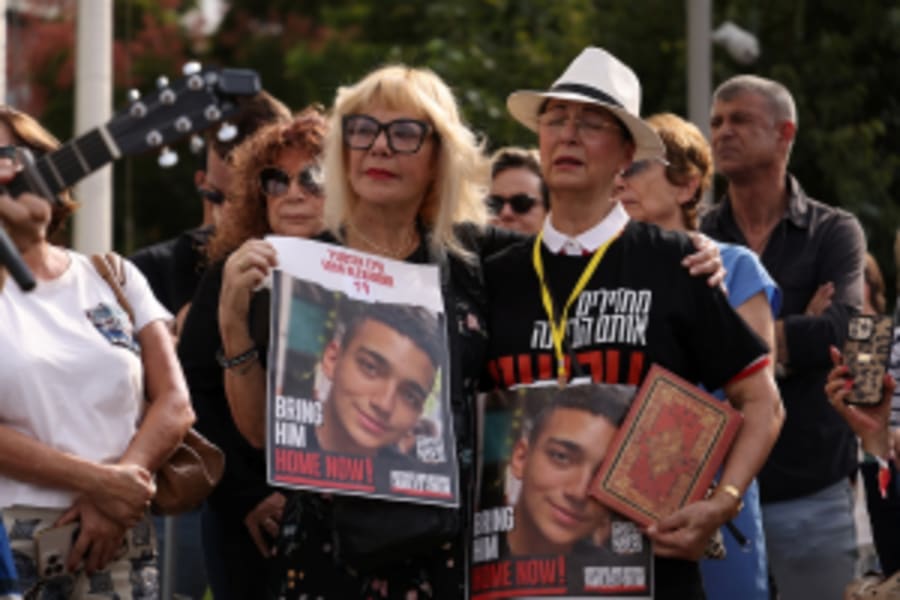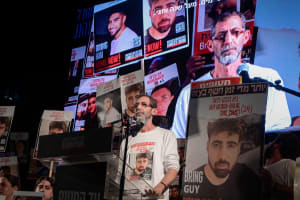Gallant’s attack on Netanyahu airs government’s dirty laundry - but there is no easy answer for the ‘day after’ in Gaza
Who will rule in Gaza? There doesn't seem to be a good answer

After simmering under the radar for months, on Wednesday one of the biggest conflicts within the Israeli government was brought out into the open with a bang.
In a televised statement reminiscent of the one that led to his firing (and subsequent reinstatement) last year, Defense Minister Yoav Gallant slammed Prime Minister Benjamin Netanyahu for his policy, or rather the lack thereof, regarding who should rule Gaza after the war.
“Indecision, is in essence, a decision – this leads to a dangerous course, which promotes the idea of Israeli military and civilian governance in Gaza,” Gallant – a member of Netanyahu's Likud party – charged, vowing that he wouldn’t support it.
He called on Netanyahu to declare that Israel wouldn’t continue to rule the enclave after the war while dropping hints that Netanyahu’s motivations were political, as the prime minister tries to appease his more right-leaning coalition partners, who went on to savagely attack Gallant for his comments.
The defense minister’s statement followed an earlier video released by Netanyahu, in which he reiterated his position that discussions about the “day after” in Gaza were meaningless until Hamas was defeated. He later responded to Gallant, saying he wouldn’t “switch from Hamastan to Fatahstan.” Netanyahu has repeated this slogan many times to express his opposition to the Palestinian Authority (PA), which is controlled by the Fatah faction, having a role in Gaza governance following the war.
Gallant’s statement lifted the veil on a conflict dividing Israel’s government and security services since the war began, and has been further inflamed by constant pressure from the Biden administration demanding Israel to lay out its policy for the “day after.”
For months, Israeli media reports have quoted unnamed senior IDF officers complaining about the lack of strategy in Gaza, while Benny Gantz, Gadi Eisenkot, and the rest of the National Unity Party have done so openly but without quitting the government yet.
The clearest example of the dangers resulting from this can be seen in the ongoing IDF offensive, which saw Israeli soldiers enter the area of Jabaliya for the second time, and the town of Zeitoun for the third time since last October.
Israel’s security chiefs are in favor of the solution that was already laid out by U.S. President Joe Biden in November, and envisions “Gaza and the West Bank… reunited under a single governance structure, ultimately under a revitalized Palestinian Authority.”
While the PA has taken some steps to show its intention to “revitalize,” it has also taken part in unity talks with Hamas, underlining the danger of transferring power to a group that “supports terror, educates for terror, and funds terror,” as Netanyahu said Wednesday.
Another option that has been discussed is transferring Gaza's governance to a “coalition of the willing” made up of moderate Arab states. One version of this even envisions Gaza being turned into a “Singapore on the Mediterranean.”
All of these plans so far foundered on the high hurdles posed by the Arab states, including the recognition of a Palestinian state, and don’t seem to be advancing toward success.
Another possibility, which has already been considered a failure, was the idea of transferring power to local, non-Hamas-affiliated clans in Gaza.
After appearing to gather some steam in January, this hope was dashed when Arab media reported in March that Hamas had executed the head of a local clan for allegedly working with Israel.
In an interview at the end of March, Israeli Minister of Strategic Affairs Ron Dermer, who is an observing member of the War Cabinet and seen as a one of Netanyahu’s closest confidants, gave a glimpse into the thinking among the prime minister’s inner circle which was the touchstone of Gallant’s and the security chiefs’ anger.
“You can’t end their political rule in Gaza without dismantling their military capabilities,” Dermer said. “It’s impossible to have a conversation about the 'day after' plan until Hamas knows they’re gone.”
The idea that any other force would enter Gaza before Hamas was decisively defeated is “ridiculous,” he added.
Any idea championed by Israel would automatically be unpopular among Palestinians and the “Arab street,” Dermer argued, suggesting that the demands should instead be directed towards the U.S. and the international community.
Instead of continuing to effectively communicate these thoughts, however, the prime minister apparently did not see it necessary to discuss this issue in recent months, either publicly or privately, causing Gallant to air the government’s dirty laundry for all to see.
But despite the deep rift between Gallant and Gantz’s National Unity Party on one side and the rest of the government on the other, it appears unlikely that the shaky wartime emergency coalition will come to an end over this issue.
Netanyahu’s last attempt to fire Gallant ended in humiliation, and the defense minister has eroded all support in his own party, making it unlikely he’ll quit his position of power without a backup plan.
While political considerations are sure to play a role on all sides, the central question of who will govern Gaza after the war simply has no ready answer.
Most Israelis oppose handing the reins back to the PA, while large parts of the population also don’t want to see their children fighting insurrections in the enclave’s winding alleyways over the next decades. And the Arab states don’t appear to be eager to govern there either.
Meanwhile, the question at heart continues to linger unsolved, and IDF soldiers continue to fight, and die, in places they vacated only weeks earlier.

Hanan Lischinsky has a Master’s degree in Middle East & Israel studies from Heidelberg University in Germany, where he spent part of his childhood and youth. He finished High School in Jerusalem and served in the IDF’s Intelligence Corps. Hanan and his wife live near Jerusalem, and he joined ALL ISRAEL NEWS in August 2023.
You might also like to read this:














